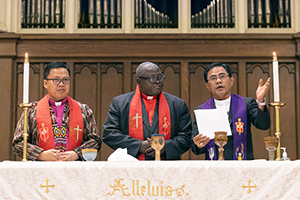Key points:
- Quietly, General Conference is making historic changes to The United Methodist Church’s policies related to LGBTQ people.
- Some of the items passed during the morning plenary eliminate parts of the Traditional Plan passed at the 2019 General Conference. That package aimed at strengthening the denomination’s longtime restrictions.
- This is just the beginning of possible changes to the Book of Discipline, the denomination’s policy book.
General Conference delegates have begun making historic policy changes that chip away at longtime church restrictions against LGBTQ people.
Without debate, delegates voted by 667 to 54 for the changes on the day’s consent calendar, which allows the lawmaking assembly to approve multiple pieces of legislation in bulk. To make it onto the consent calendar, petitions must receive no more than 10 “no” votes in legislative committee and have no implications for the denomination’s budget or constitution.
Some of the items passed during the April 30 morning plenary eliminate parts of the Traditional Plan passed by a vote of 438-384 at the 2019 General Conference. That package aimed at strengthening the denomination’s longtime restrictions on same-sex marriage and “self-avowed practicing” gay clergy.
Subscribe to our
e-newsletter
This is just the beginning of possible changes to the Book of Discipline, the denomination’s policy book, during the first General Conference since a quarter of U.S. churches left the denomination.
General Conference delegates will have the chance to vote later this week on more petitions that would do away with the denomination’s longtime bans, as well as the 52-year-old stance that “the practice of homosexuality … is incompatible with Christian teaching.”
“With the approvals and acceptance of the things today by the General Conference, we’re beginning to see the unwinding, unraveling, dismantling of the heterosexism, the homophobia, the hurt and the harm of The United Methodist Church,” said the Rev. David Meredith.
He is a gay and married retired elder in the West Ohio Conference and board chair of the advocacy group Reconciling Ministries Network, which seeks full inclusion of LGBTQ people in the life of The United Methodist Church.
Changes approved on the April 30 consent calendar:
- Remove a ban on annual conferences from giving United Methodist funds to any “gay caucus group” or using funds to “promote the acceptance of homosexuality.” Instead, the provision now says annual conferences should honor the denomination’s commitment not to reject lesbian or gay members.
- Eliminates the requirement that the General Council on Finance and Administration, the denomination’s finance agency, enforce the funding ban. Instead, the provision says the finance agency should ensure that church funds are not used to reject LGBTQ people or limit the church's response to the HIV epidemic.
- Strike the ban on boards of ordained ministry from even considering candidates without evaluating whether they are “self-avowed practicing” gay people, and strike the requirement that bishops rule gay candidates ineligible.
- Erase the mandatory penalty of at least a one-year suspension without pay for clergy found guilty of officiating at same-sex weddings or unions. This was the denomination’s only chargeable offense with a mandatory penalty.
- Encourage inclusion of LGBTQ people and people of varied economic status on denominational boards.
- Allow gay clergy in good standing to be appointed across annual conference lines when their bishop can’t locate an appointment in their conference.
- Set a moratorium on judicial proceedings related to the denomination’s bans against “self-avowed practicing” gay clergy and same-sex weddings. The moratorium will last until General Conference alters it.
The day’s consent calendar also removed provisions in the Traditional Plan that banned bishops from consecrating gay bishops and ordaining gay clergy, and it removed changes that the plan made to the denomination’s complaint process aimed at empowering the people making complaints.
Some of these changes, including the moratorium, take immediate effect upon the adjournment of General Conference.
The Rev. Jeff Campbell, the top executive of Discipleship Ministries, said his agency welcomes the abolishment of the funding ban. Discipleship Ministries connects United Methodist churches and conferences with resources for spiritual formation, evangelism, church revitalization and new church development.
He said the change frees the agency “to fully serve all those who seek our support without worry of unnecessary, discriminatory oversight.”
“Discipleship Ministries staff remains committed to challenging and supporting all leaders for our missional task of making disciples of Jesus Christ for the transformation of the world,” he said by email.
Backers of changing the Discipline’s language around LGBTQ people have said their goal is to get the policy book “to neutral” when it comes to homosexuality.
Jan Lawrence, Reconciling Ministries Network’s executive director, explained what she means by “neutral.”
“So when somebody says, ‘getting to neutral,’ that to me is coming back to a place where we have taken out all of the language that identifies a group of people and discriminates against them,” she said. “That, to me, is neutral language.”
Hahn is assistant news editor for UM News. Contact her at (615) 742-5470 or newsdesk@umnews.org. To read more United Methodist news, subscribe to the free daily or weekly Digests.




